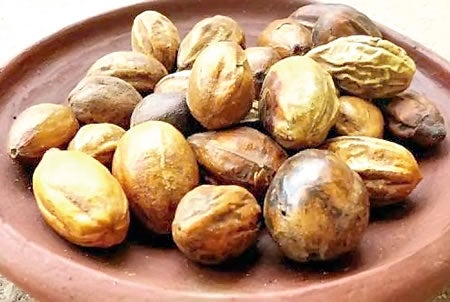BENEFITS OF ALMOND CONSUMPTION TO THE SKIN
Natural, unsalted almonds are a tasty and nutritious snack with plenty of health benefits; including lowering blood pressure, controlling blood sugar and cholesterol levels and alleviating constipation. But much more, daily almond consumption may reduce wrinkle severity.
Researchers in a randomised controlled pilot study on the effects of almond consumption on skin lipids and wrinkles confirmed that almond consumption is protective from the sun’s ageing effect on the skin.
They suggest that daily consumption of almonds may be an effective option to prevent the progression of normal ageing including wrinkles in postmenopausal females. It was in the journal, Phytotherapy Research.
Fifty healthy postmenopausal women were recruited and screened for eligibility at the UC Davis Dermatology clinic for the 16 week clinical study.
Thirty one eligible participants (all postmenopausal females) were randomized into two intervention groups: almond group (ages 55 to 80 years old) and control group (ages 53 to 75 years old).
The two intervention groups consisted of those receiving almonds and those who received a nut free calorie matched snack. Participants were enrolled and assigned to one of the groups by the clinical research coordinator.
Almonds were provided to intervention subjects as raw almonds supplying 20 per cent of total daily energy requirements. Participants received an average of 340 kcal/day of almonds packaged into daily portions.
The control snack was commercially available, individually wrapped food products that were nut free and matched for calorie intake: a cereal bar, a small granola bar, and pretzels.
Participants were advised to consume their provided dietary intervention (either almonds or nut free snack) daily and to avoid all nuts or nut containing products, but otherwise, to continue their normal total daily energy consumption.
Facial wrinkle depth and severity were analysed in the study participants at the baseline visit, eight and 16 weeks. The severity score is based on both the depth and the visible length of the wrinkles. Subjects were asked to report any adverse effects throughout the study.
An almond, despite being classified as a nut by most, is actually the seed from the fruit of an almond tree. This dry fruits, scientifically called Prunus dulcis, is native to the Middle East, India, and North Africa.
The almond eaten is actually the pits of these fruits. Once they are cracked open, the delicious meat of the nut can be eaten! This partially explains why there are so many nutrients found in these nuts; they are the core nutrients needed for a new plant to grow.
The taste of almonds may range from sweet to bitter. Both are readily available in markets and can be purchased based upon one’s taste and cooking use. Sweet almonds are edible, while bitter ones are used for making oil, which is commonly used to add flavour to the food.
Skin wrinkles result from the intrinsic ageing processes and other environmental stressors such as sun exposure, cigarette smoking and obesity that accumulate over a lifetime.
There is increasing interest by consumers and patients and growing research to address effects of various foods on skin appearance and skin ageing processes.
In the study, the researcher said wrinkle severity and wrinkle width were significantly decreased by nine per cent and 10 per cent, respectively, in the almond intervention group compared with the control intervention group after 16 weeks.
In particular, for consumers who value food based therapies as nutritional options for antiaging purposes, they declared “almond consumption has appeal due to its overall health promoting benefits including essential fatty acids and vitamin E.
“Our results show that wrinkle severity can be improved even when the sebum excretion remains unchanged. Extrapolated to a clinical setting, dietary vitamin E from the consumption of almonds may serve natural antiaging benefits.
“Future studies will need to expand to a larger recruitment pool. Our study is limited to cosmetic evaluation, as no measurements were made regarding collagen production. Lastly, our study did not evaluate diseases or younger subjects; therefore, our findings are limited to otherwise healthy postmenopausal females.”
Previously, a clinical study demonstrated that in patients with coronary artery disease who consumed a small dose (10 g/day) of almonds that were soaked overnight and taken on an empty stomach, the levels of the protective high density lipoprotein was significantly increased in addition to improvement in other lipid parameters after six and 12 weeks.
Furthermore, studies have also shown that people who regularly consume almonds (at least twice a week) are far more likely to remain at their ideal weight, rather than those who rarely or never consume almonds and suffer from weight fluctuations.

